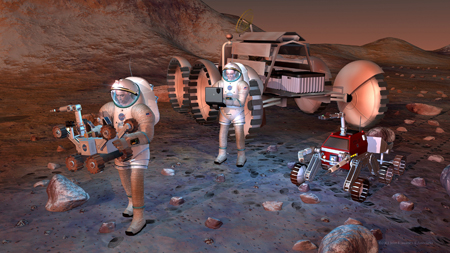
NASA/JPL
Humanity Gets an Upgrade at the MIT Media Lab
Two years ago, IFTF’s Technology Horizons program explored the implications of what we called “the extended self”. The core hypothesis was that the body is becoming a platform for a whole range of technological augmentations. These deliberate enhancements run the gamut from mobile phones and social network software, to cochlear implants to restore lost hearing.
One of the really interesting implications of that research was the insight that we are increasingly seeing people leveraging therapeutic technologies to create super-human abilities. This is clearly the case in athletics, but you can also this at work with college students abusing drugs like Ritalin and Adderall to maintain focus during long study sessions. Michael Chorost, who wrote so eloquently about his relationship with his cochlear implant, forecasts that people will almost certainly exploit the potential of that technology to provide super-human hearing for healthy people. Even though only six people have had therapeutic retinal implants to date, it probably won’t be long before someone develops a retinal implant that gives its symbiant the ability to see X-rays or infrared…. if they haven’t already.
source: Institute for the Future

still form Metalosis Maligna, a fictitious documentary, by Floris Kaayk , about a spectacular yet viciously disabling disease which affects patients who have been fitted with medical implants. Sourcing from such implants a wild metal growth ultimately transforms human patients into mechanical looking constructions.
“Western philosophy has betrayed the body; it has actively participated in the great process of metaphorization that has abandoned the body; and it has denied the body. The living body, being at once ‘subject’ and ‘object,’ cannot tolerate such conceptual division, and consequentely philosophical concepts fall into the category of the ‘signs of non-body’.” -Henri Lefebvre-